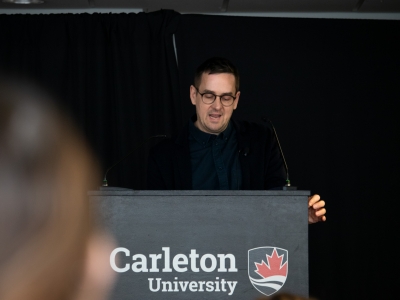Acting within the tuition framework policy established by the province, Carleton’s Board of Governors today approved a three-per-cent average increase in domestic tuition in each of the 2017-’18 and 2018-’19 academic years.
This increase is in line with the recent decision by the Ministry of Advanced Education and Skills Development to extend the current tuition framework for another two years.
The average tuition for undergraduate arts and science programs at the 10 major universities in Ontario, which includes Carleton, was $6,379 in 2016-’17. The comparable tuition at Carleton was $6,356.
The new tuition rates at Carleton follow the announcement contained in the provincial budget providing free tuition to qualified students whose family’s average incomes are less than $50,000, effective 2017-’18. The provincial policy created the new Ontario Student Grant that targets more exclusive support for low-income students to promote access to a university education.
The tuition increase is essential in meeting increased costs of operating the university and continuing to provide the highest quality of teaching and research at Carleton. At the same time, the changes introduced by the Government of Ontario through the coming “net billing” system will make it easier for students to manage the costs of their university education, and will significantly reduce up-front costs for most students.
The published price of tuition is not the real measure of the cost of a university education. Many students pay much less. The coming net tuition billing system will show the actual price students pay after factoring in scholarships, bursaries and government grants. Over half of Carleton students (50-60 per cent) will see reductions in tuition fees through government grants and Carleton scholarships. Students who are most in need of financial aid will pay a small fraction or no tuition fees.
Carleton invests heavily in student support. The university’s budget includes considerable support for student bursaries, awards, scholarships, fellowships and assistantships. In its 2017-’18 budget, Carleton allocated 10 per cent of its operating expenditures toward student aid and enrolment incentives.
Carleton is committed to maintaining a sustainable budget in the coming years while ensuring accessibility for students.
Other News from the Board of Governors meeting:
New Board Member: The Board approved the nomination of Peter Dinsdale, president and CEO of YMCA Canada, as a new member of the Board. He has worked and volunteered on local, regional and national levels throughout his career. A former chief executive officer for the Assembly of First Nations, executive director of the National Association of Friendship Centres, and the YMCA Canada Board of Directors, he holds a bachelor’s degree in Native Studies/Political Science and master of arts (Interdisciplinary Humanities) from Laurentian University. He has co-edited three volumes of Indigenous policy research and has also written on Indigenous policy. He holds an honorary degree from Canadore College.
Nominating Policy: The Nominating Policy process was clarified and an appeal process added. The Board will be seeking nominations for student governors in February. More information about the nomination process is available at:
http://carleton.ca/secretariat/boardofgovernors/elections-nominations/student-representatives/
IT Security: Denis Levesque, chief information officer, Information Technology Services, delivered a presentation on IT security.



